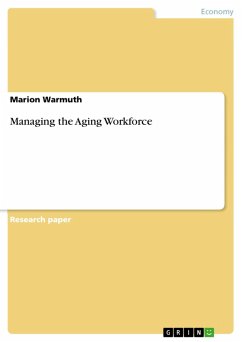Diploma Thesis from the year 2006 in the subject Leadership and Human Resources - Miscellaneous, grade: 1,0, Curtin University of Technology (Wirtschaftswissenschaften and Curtin Business School), language: English, abstract: Germany's population, and consequently its workforce is ageing. Fewer young people will enter the workforce and employers will be pressed to draw from an expanding pool of older people. As a consequence the working age population is projected to decline significantly; while the numbers of organisations depended on them will rise. At the same time, baby boomers are moving towards retirement and can not be replaced by middle-aged or younger workers. Facing impending talent shortages and a substantial loss of knowledge and experience, companies might have little choice but to implement new employment strategies. Primarily based on secondary research and supported by available data from various research institutions, this paper considers relevant variables and approaches related to challenges from a German perspective. This is done regardless of specific industry conditions and circumstances. The paper covers selected peripheral issues like attitudes and retirement intentions of older workers and the myths and stereotypes about them. It provides an overview of the German labour market, specifically the situation of older people, and how public policy has been responding to improve related conditions. Finally, minor and major interventions are presented to adapt human resource methods, work arrangements, and framework conditions. Recognising that an effective response to the demographic changes requires a broader perspective, i.e. considering all working generations, the proposed initiatives primarily focus on the attraction and retention of older people.
Dieser Download kann aus rechtlichen Gründen nur mit Rechnungsadresse in A, B, BG, CY, CZ, D, DK, EW, E, FIN, F, GR, HR, H, IRL, I, LT, L, LR, M, NL, PL, P, R, S, SLO, SK ausgeliefert werden.









